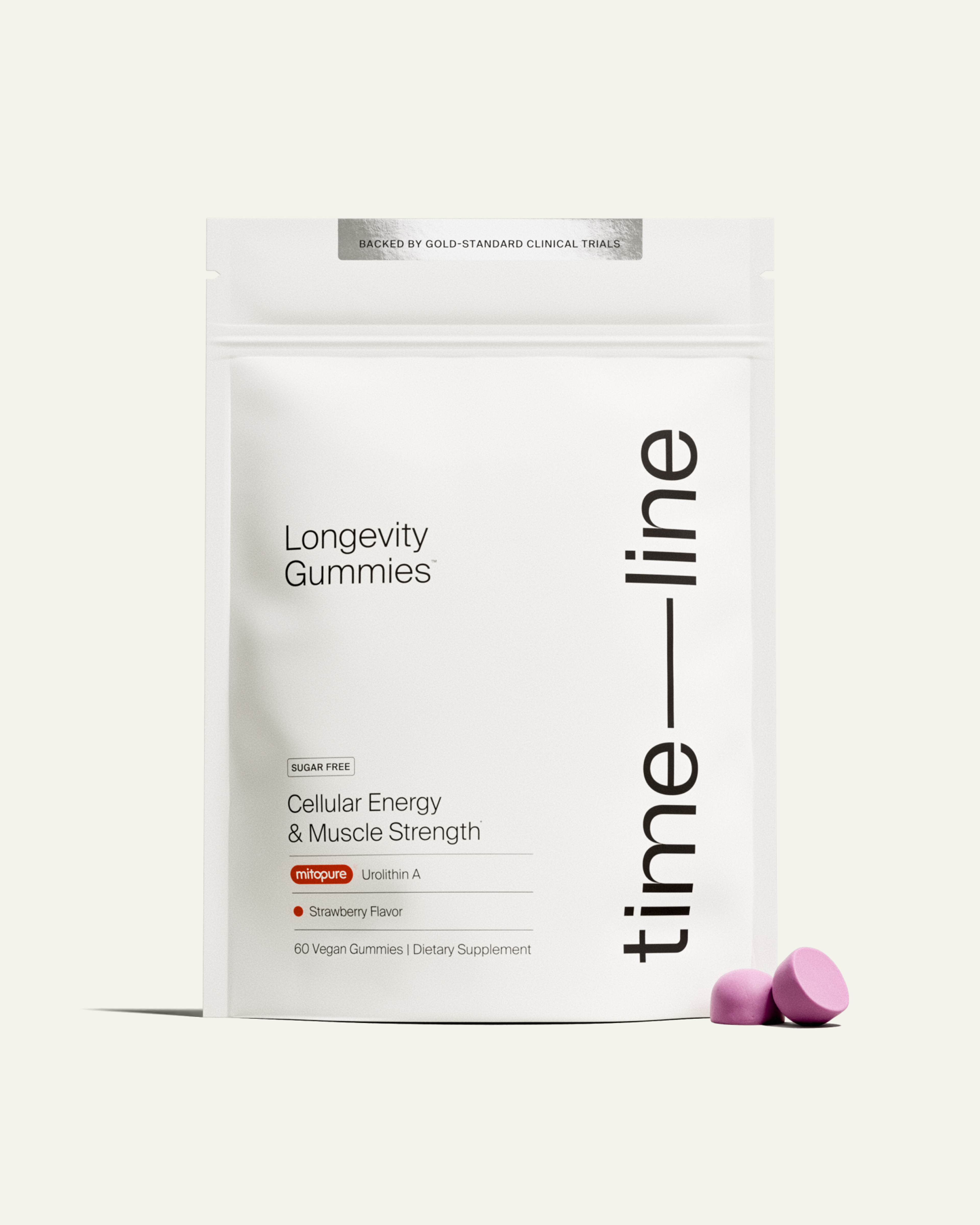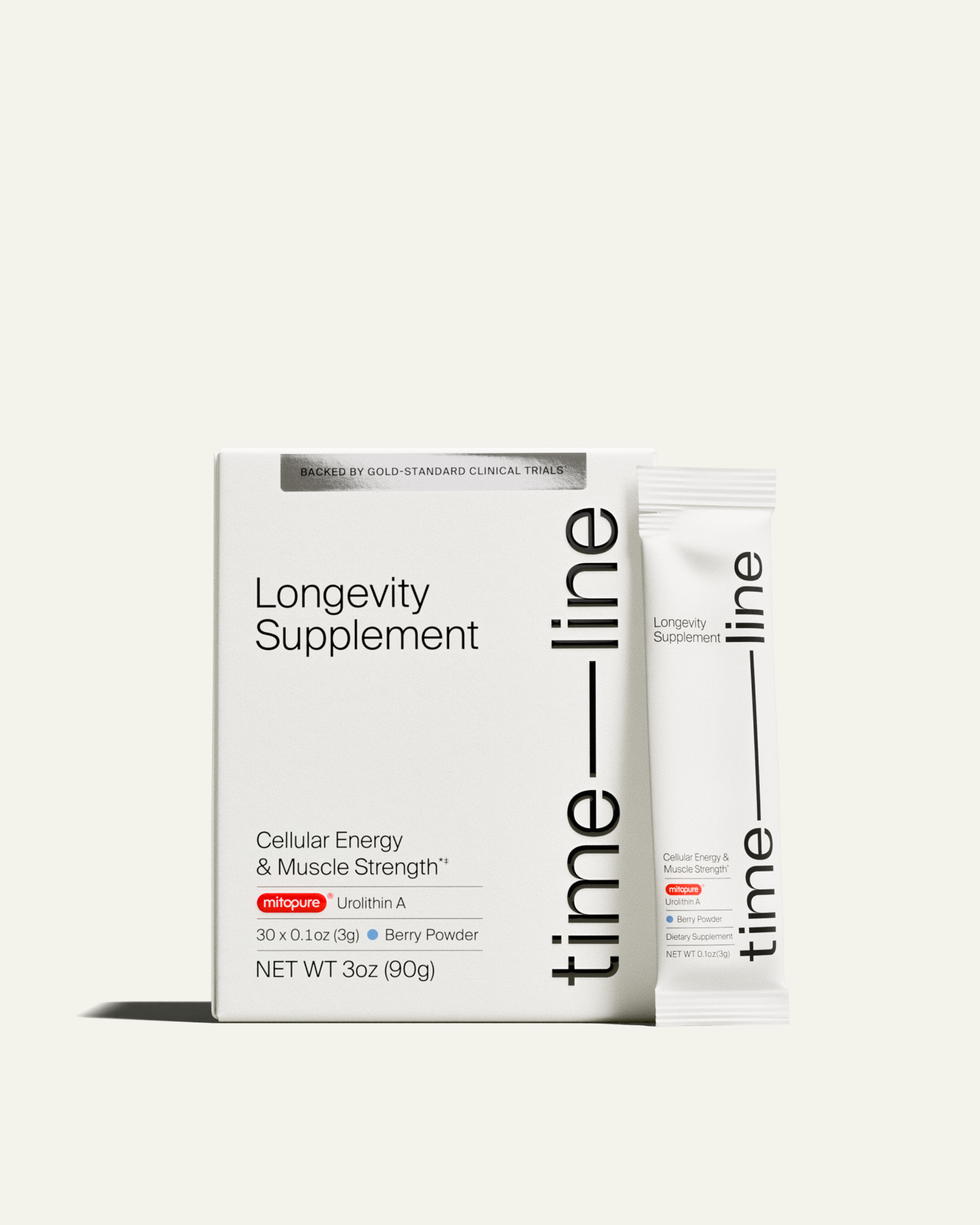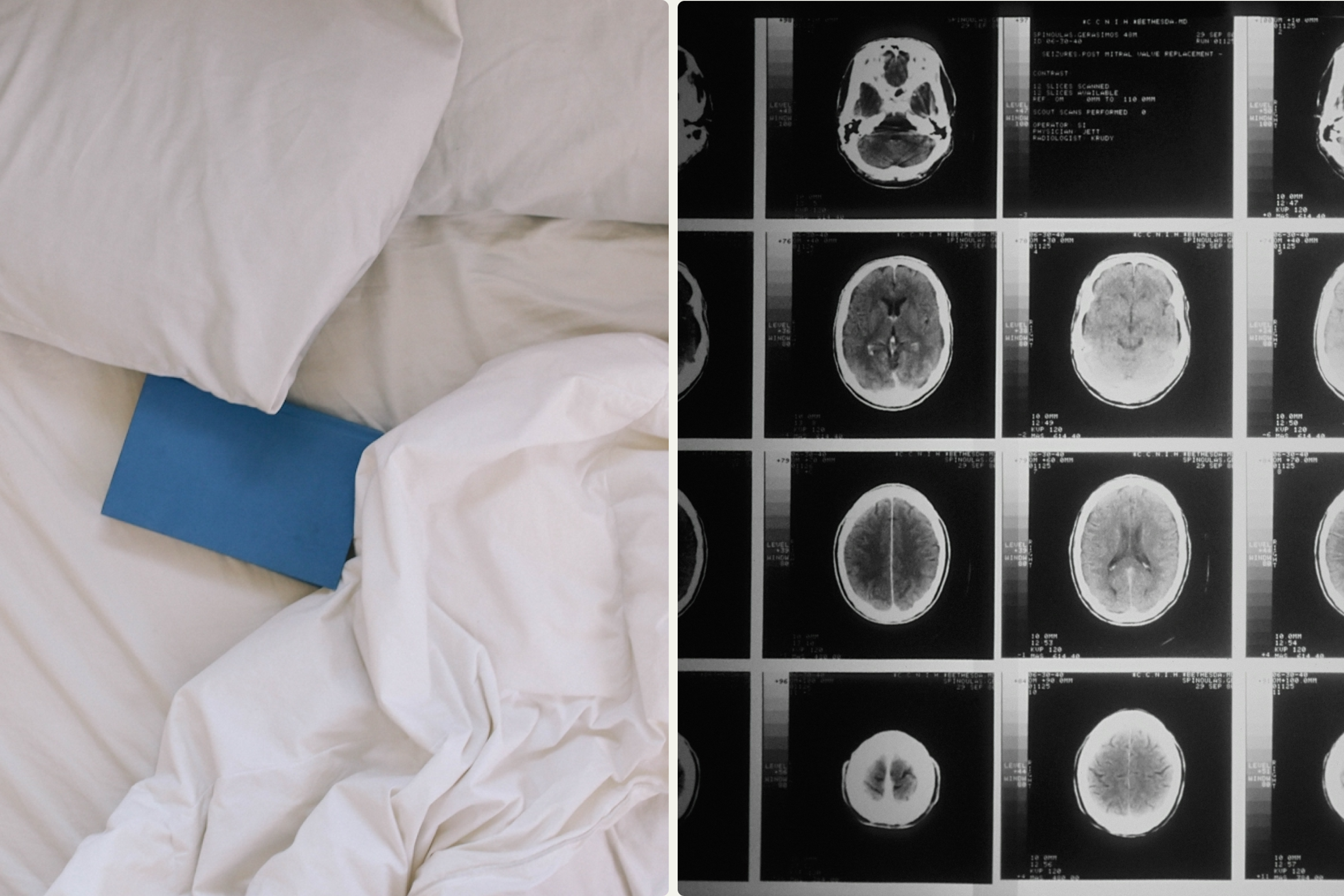Brain Fog Mitochondria Connection - The Vital Energy Link
Suffering from brain fog? Learn the most common cognitive fatigue causes and how to optimize your mitochondria to support cognitive health.

What to know
Brain fog and cognitive fatigue increase with age due to declining mitochondrial function.
As we age, mitochondrial energy output decreases and oxidative stress rises, affecting memory, attention, and brain resilience.
Exercise, antioxidant-rich foods, quality sleep, and stress management can help maintain healthier mitochondria and sharper thinking.
Boost Your Brain Power and Longevity: The Mitochondrial Connection to Cognitive Health and Aging
As we age, maintaining brain health is essential for staying sharp, independent, and enjoying a high-quality life. One often-overlooked but critical factor in maintaining our brain health lies in our mitochondrial function.
The brain uses about 20% of the body’s total energy, making it especially reliant on the energy produced by mitochondria—our cells’ powerhouses.[1] These tiny organelles generate the fuel brain cells need to think clearly, retain information, and stay focused throughout the day.
Mitochondria and brain fog are highly linked, as mitochondrial dysfunction is one of several factors that may contribute to brain fog and cognitive fatigue, particularly as we age. When mitochondria function properly, they help protect against cognitive decline, optimize brain function, and support sharper thinking, even as we age.
Let’s explore the brain fog mitochondria connection and how you can support your brain's energy metabolism through targeted lifestyle strategies.

Understanding Mitochondria and Brain Function
Mitochondria are small structures inside your cells that serve as power generators, converting the food you eat and the oxygen you breathe into cellular energy. This process results in the creation of ATP (adenosine triphosphate), a molecule that fuels nearly every cell in your body. ATP production is especially critical in the brain,[2] as it requires a significant amount of energy to maintain clear thinking, learning, and memory.
While researchers are still uncovering the full extent of mitochondria’s role in brain health, several strong connections have already been established. Beyond energy production, mitochondria support key aspects of cellular health that influence how brain cells operate.
Because our brain and nerve cells need a constant supply of energy, when mitochondria aren’t working properly, brain and neuronal function are impacted.[3]
Here are a few ways that mitochondrial dysfunction impacts brain health, beyond brain energy metabolism:[4]
- Low ATP = Low brain power: With poor brain energy metabolism and low cellular energy, neurons struggle to function properly, resulting in issues with memory and focus.
- Damaged mitochondrial DNA can disrupt how brain cells operate and may contribute to the development of neurodegenerative disease.
- Mitochondrial movement matters: Mitochondria must constantly divide, fuse, and relocate within brain cells. If this goes wrong, it can cause neuron damage and even cell death.
- Mitochondria regulate intracellular calcium balance, and when that balance is disrupted, it can impact brain health.
- Inflammation and oxidative stress are associated with impaired mitochondrial function and brain diseases.
- Emerging research suggests a connection between mitochondrial health and neurotransmitter metabolism and signaling.
The good news is that recent research shows that individuals with stronger mitochondrial function tend to have better brain structure and experience less age-related cognitive decline.[5]

The Link Between Mitochondrial Dysfunction and Brain Fog
Given the brain's high metabolic demand, it relies heavily on efficient brain energy metabolism to fuel processes like thinking, memory, and focus. Since the mitochondria are our prime energy generators in the cell, it makes sense that mitochondrial dysfunction symptoms like brain fog can appear.
Brain fog is hard to describe, but if you have it, you know it. Medical professionals define it as a cluster of symptoms that impact thinking, concentration, and memory.[6]
What causes brain fog?
- Stress
- Lack of sleep
- Medications
- Mitochondrial dysfunction
- Aging
- Hormone changes (such as during menopause or pregnancy)
- Diet and nutrient deficiencies
- Chronic conditions and diseases such as long COVID or autoimmune disease[7]
Cognitive fatigue often coincides with brain fog and is characterized as a state of mental exhaustion that impairs productivity in the workplace.[8] It can be frustrating because when it is severe, it hinders the completion of day-to-day tasks. Cognitive fatigue can also be caused by many of the same mechanisms that lead to brain fog, as well as taking on too much of a mental load.
Many cognitive fatigue causes can stem from the underlying problem – mitochondrial dysfunction.
What Causes Mitochondrial Dysfunction?
There are several root causes of mitochondrial dysfunction, including:
- The aging process
- Oxidative stress
- Sleep deprivation
- Chronic stress
- Environmental factors - cigarette smoking, occupational chemicals, and other toxins
- Genetic mutations
- Nutrient deficiencies and poor diet
- Sedentary lifestyle
And while mitochondrial damage is not the only cause of cognitive decline, it is certainly one of the contenders.
Mitochondrial Health and Aging: The Cognitive Connection
Mitochondrial aging doesn’t happen overnight, but occurs gradually, leading to reduced energy production and increased oxidative stress as we age.[9] This can impair cognitive processes, including memory and attention, thereby contributing to age-related cognitive decline.[10]
The mitochondria play a crucial role in powering brain cells, particularly in areas such as the hippocampus, which are essential for memory and cognitive function. Healthy mitochondrial function is thus imperative to “connecting all the dots” and keeping your brain sharp, focused, and resilient as you age.[11]
While therapies that target mitochondrial health are not a standalone solution, supporting your brain mitochondria through lifestyle strategies may help slow or prevent further cognitive decline. They can do this by reducing oxidative stress, inflammation, and mitochondrial damage.[12]
Lifestyle Strategies to Support Mitochondrial and Cognitive Health
Several lifestyle habits can enhance mitochondrial function, thereby promoting cognitive health. From diet to exercise, sleep, and stress reduction, there is an array of strategies to draw from.

Diet
A whole foods diet, like the Mediterranean diet, that’s rich in plants, healthy fats, and protein, and limits ultra-processed foods, will nourish your brain and your mitochondria. This style of eating supports energy metabolism, reduces inflammation, and provides essential nutrients that protect against cognitive decline.

Key dietary habits that support brain and mitochondrial health include:
- Prioritizing antioxidant-rich foods like berries, leafy greens, and cruciferous vegetables, which help reduce oxidative stress[13]
- Including healthy fats, especially omega-3s from fatty fish, flaxseeds, and walnuts, which support brain structure and function[14]
- Choosing high-quality proteins that supply the amino acids needed for neurotransmitter production and mitochondrial repair[15]
- Ultra-processed foods, especially those high in added sugars, refined grains, sodium, and unhealthy fats, can impair mitochondrial function and increase brain fog[16]
Blood sugar stability is also key. Sharp spikes and crashes in blood glucose can affect energy levels, mood, and mental clarity. Support steady blood sugar by pairing carbohydrates with protein or fat, avoiding high-sugar snacks, and eating regularly throughout the day.[17]
What you drink matters too:
- Alcohol can disrupt sleep, spike blood sugar, dehydrate the brain, and impair mitochondrial function—all of which contribute to brain fog. Even moderate drinking may affect mental clarity the next day.[18]
- Caffeine can offer a temporary cognitive boost by enhancing alertness and focus, but timing matters. Consuming caffeine later in the day (after 2 p.m.) may interfere with sleep and exacerbate next-day fatigue and brain fog.[19]
Every bite and sip can either fuel your focus or fog it. Choose accordingly.

Exercise
Physical activity enhances the number and function of mitochondria, thereby improving energy utilization in the brain. This supports better memory, focus, and overall cognitive health.[20]
You don’t have to be in peak physical fitness to reap the cognitive benefits of exercise. If it’s new to you, just starting with a daily walk, even for as little as 10 minutes,[21] is shown to produce benefits for brain fog, mitochondria and alertness. However, if you love high-intensity exercise, kicking things up a notch may provide even greater brain boosts.[22]
The bottom line? Any type of exercise can help reduce brain fog, so focus on incorporating some form of movement that you enjoy every day and at any time you find yourself losing mental energy.

Sleep and Stress Management
Sleep and stress management play a key role in protecting mitochondrial health.[23] Chronic stress can disrupt mitochondrial function, affecting the brain’s energy balance and contributing to cognitive decline.
Additionally, poor sleep[24] can affect cellular aging, brain function, and mitochondrial function. While one night of sleep loss won’t make or break things, chronic sleep deprivation accelerates brain aging.[25]
Aim to establish a more regular bedtime routine to prime yourself for sleep, such as reading a book, taking a warm bath, or meditating, to signal to your body and brain that it’s time to rest. This wind-down routine can also help alleviate stress and calm the mind.
Key Takeaways for Supporting Brain and Mitochondrial Health
Mitochondria produce energy and regulate oxidative stress, both of which are essential for brain health and overall function. Simple lifestyle changes such as incorporating a nutrient-rich diet, staying physically active, managing stress, and prioritizing sleep can make a meaningful difference in reducing mitochondrial brain fog and preserving a sharper mind.
Even small daily changes, such as going for 10-minute walks, eating more vegetables, and establishing a regular bedtime routine, can promote a longer life.
Authors

Written by
Dietitian-Nutritionist, and Health Content Writer

Reviewed by
Director Science Communications
References
- ↑
Padamsey Z, Rochefort NL. Paying the brain's energy bill. Curr Opin Neurobiol. 2023 Feb;78:102668. doi: 10.1016/j.conb.2022.102668. Epub 2022 Dec 24. PMID: 36571958.
- ↑
1. Clemente-Suárez VJ, Redondo-Flórez L, Beltrán-Velasco AI, et al. Mitochondria and Brain Disease: A Comprehensive Review of Pathological Mechanisms and Therapeutic Opportunities. Biomedicines. 2023;11(9):2488. Published 2023 Sep 7. doi:10.3390/biomedicines11092488
- ↑
Khacho M, Clark A, Svoboda DS, et al. Mitochondrial dysfunction underlies cognitive defects as a result of neural stem cell depletion and impaired neurogenesis. Hum Mol Genet. 2017;26(17):3327-3341. doi:10.1093/hmg/ddx217
- ↑
Clemente-Suárez VJ, Redondo-Flórez L, Beltrán-Velasco AI, Ramos-Campo DJ, Belinchón-deMiguel P, Martinez-Guardado I, Dalamitros AA, Yáñez-Sepúlveda R, Martín-Rodríguez A, Tornero-Aguilera JF. Mitochondria and Brain Disease: A Comprehensive Review of Pathological Mechanisms and Therapeutic Opportunities. Biomedicines. 2023; 11(9):2488. https://doi.org/10.3390/biomedicines11092488 (https://www.google.com/url?q=https://doi.org/10.3390/biomedicines11092488&sa=D&source=docs&ust=1754533562823014&usg=AOvVaw20WNoouxLbiG9JjeBIjvAj)
- ↑
4. Bartman S, Coppotelli G, Ross JM. Mitochondrial Dysfunction: A Key Player in Brain Aging and Diseases. Curr Issues Mol Biol. 2024;46(3):1987-2026. Published 2024 Mar 2. doi:10.3390/cimb46030130
- ↑
"Brain Fog." Cleveland Clinic, my.clevelandclinic.org/health/symptoms/brain-fog (https://www.google.com/url?q=http://my.clevelandclinic.org/health/symptoms/brain-fog&sa=D&source=docs&ust=1754533562798134&usg=AOvVaw18yXIeJqOwMzkbpYAbiRq6). Accessed 24 Jul. 2025.
- ↑
Clemente-Suárez VJ, Redondo-Flórez L, Beltrán-Velasco AI, Ramos-Campo DJ, Belinchón-deMiguel P, Martinez-Guardado I, Dalamitros AA, Yáñez-Sepúlveda R, Martín-Rodríguez A, Tornero-Aguilera JF. Mitochondria and Brain Disease: A Comprehensive Review of Pathological Mechanisms and Therapeutic Opportunities. Biomedicines. 2023; 11(9):2488. https://doi.org/10.3390/biomedicines11092488 (https://www.google.com/url?q=https://doi.org/10.3390/biomedicines11092488&sa=D&source=docs&ust=1754578731022247&usg=AOvVaw3kngeY3cV6skPHcDmxp1cj)
- ↑
Steward G, Chib VS. The Neurobiology of Cognitive Fatigue and Its Influence on Effort-Based Choice. bioRxiv [Preprint]. 2024 Jul 18:2024.07.15.603598. doi: 10.1101/2024.07.15.603598. Update in: J Neurosci. 2025 Jun 11;45(24):e1612242025. doi: 10.1523/JNEUROSCI.1612-24.2025. PMID: 39071329; PMCID: PMC11275777.
- ↑
8. Cicali KA, Tapia-Rojas C. Synaptic mitochondria: A crucial factor in the aged hippocampus. Ageing Research Reviews. 2024;101:102524. doi:https://doi.org/10.1016/j.arr.2024.102524 (https://www.google.com/url?q=https://doi.org/10.1016/j.arr.2024.102524&sa=D&source=docs&ust=1754533562815313&usg=AOvVaw2gR15ke2HL8n0BU4oF5zbB)
- ↑
9. Geary DC. Mitochondrial Functioning and the Relations among Health, Cognition, and Aging: Where Cell Biology Meets Cognitive Science. International Journal of Molecular Sciences. 2021; 22(7):3562. https://doi.org/10.3390/ijms22073562 (https://www.google.com/url?q=https://doi.org/10.3390/ijms22073562&sa=D&source=docs&ust=1754533562813219&usg=AOvVaw2A1pAr4uXiNmz9rYc0r9Fa)
- ↑
10. Olesen MA, Torres AK, Jara C, Murphy MP, Tapia-Rojas C. Premature synaptic mitochondrial dysfunction in the hippocampus during aging contributes to memory loss. Redox Biol. 2020;34:101558. doi:10.1016/j.redox.2020.101558
- ↑
11. Song, N., Mei, S., Wang, X. et al. Focusing on mitochondria in the brain: from biology to therapeutics. Transl Neurodegener 13, 23 (2024). https://doi.org/10.1186/s40035-024-00409-w (https://www.google.com/url?q=https://doi.org/10.1186/s40035-024-00409-w&sa=D&source=docs&ust=1754533562816074&usg=AOvVaw2O7nc_s8uYCrtb1vH5SbQ1)
- ↑
Baroni L, Sarni AR, Zuliani C. Plant Foods Rich in Antioxidants and Human Cognition: A Systematic Review. Antioxidants (Basel). 2021 Apr 30;10(5):714. doi: 10.3390/antiox10050714. PMID: 33946461; PMCID: PMC8147117.
- ↑
Loong, S.; Barnes, S.; Gatto, N.M.; Chowdhury, S.; Lee, G.J. Omega-3 Fatty Acids, Cognition, and Brain Volume in Older Adults. Brain Sci. 2023, 13, 1278. https://doi.org/10.3390/brainsci13091278 (https://www.google.com/url?q=https://doi.org/10.3390/brainsci13091278&sa=D&source=docs&ust=1754533562790080&usg=AOvVaw1DTvpjXOhU_FXzZbPMxwKv)
- ↑
Ragni M, Fenaroli F, Ruocco C, Segala A, D'Antona G, Nisoli E, Valerio A. A balanced formula of essential amino acids promotes brain mitochondrial biogenesis and protects neurons from ischemic insult. Front Neurosci. 2023 Jun 15;17:1197208. doi: 10.3389/fnins.2023.1197208. PMID: 37397466; PMCID: PMC10308218.
- ↑
Glauser JSO, Santana-Oliveira DA, Silva-Veiga FM, Fernandes-da-Silva A, Aguila MB, Souza-Mello V. Excessive dietary saturated fat or fructose and their combination (found in ultra-processed foods) impair mitochondrial dynamics markers and cause brown adipocyte whitening in adult mice. Nutrition. 2025 Sep;137:112805. doi: 10.1016/j.nut.2025.112805. Epub 2025 Apr 11. PMID: 40378644.
- ↑
Mortby ME, Janke AL, Anstey KJ, Sachdev PS, Cherbuin N. High "normal" blood glucose is associated with decreased brain volume and cognitive performance in the 60s: the PATH through life study. PLoS One. 2013 Sep 4;8(9):e73697. doi: 10.1371/journal.pone.0073697. PMID: 24023897; PMCID: PMC3762736.
- ↑
Karoly HC, Kirk-Provencher KT, Schacht JP, Gowin JL. Alcohol and brain structure across the lifespan: A systematic review of large-scale neuroimaging studies. Addict Biol. 2024 Sep;29(9):e13439. doi: 10.1111/adb.13439. PMID: 39317645; PMCID: PMC11421948.
- ↑
Institute of Medicine (US) Committee on Military Nutrition Research; Marriott BM, editor. Food Components to Enhance Performance: An Evaluation of Potential Performance-Enhancing Food Components for Operational Rations. Washington (DC): National Academies Press (US); 1994. 20, Effects of Caffeine on Cognitive Performance, Mood, and Alertness in Sleep-Deprived Humans. Available from: https://www.ncbi.nlm.nih.gov/books/NBK209050/?utm_source=chatgpt.com (https://www.google.com/url?q=https://www.ncbi.nlm.nih.gov/books/NBK209050/?utm_source%3Dchatgpt.com&sa=D&source=docs&ust=1754533562825054&usg=AOvVaw1fBNahFSPgW_lPAaVNLXsv)
- ↑
14. Sun L, Liu T, Liu J, Gao C, Zhang X. Physical exercise and mitochondrial function: New therapeutic interventions for psychiatric and neurodegenerative disorders. Front Neurol. 2022;13:929781. Published 2022 Sep 7. doi:10.3389/fneur.2022.929781
- ↑
Randolph DD, O'Connor PJ. Stair walking is more energizing than low dose caffeine in sleep deprived young women. Physiol Behav. 2017 May 15;174:128-135. doi: 10.1016/j.physbeh.2017.03.013. Epub 2017 Mar 14. PMID: 28302573.
- ↑
16. McIlvain G, Magoon EM, Clements RG, et al. Acute effects of high-intensity exercise on brain mechanical properties and cognitive function. Brain Imaging Behav. 2024;18(4):863-874. doi:10.1007/s11682-024-00873-y
- ↑
17. Picard M, McEwen BS. Psychological Stress and Mitochondria: A Systematic Review. Psychosom Med. 2018;80(2):141-153. doi:10.1097/PSY.0000000000000545
- ↑
https://www.timeline.com/blog/sleep-s-role-in-brain-function-for-brain-health (https://www.google.com/url?q=https://www.timeline.com/blog/sleep-s-role-in-brain-function-for-brain-health&sa=D&source=docs&ust=1754533562826874&usg=AOvVaw0HrmbttthpWmlR9yBgLZxW)
- ↑
18. Han S, Kim DK, Jun SE, Kim N. Association of sleep quality and mitochondrial DNA copy number in healthy middle-aged adults. Sleep Medicine. 2024;113:19-24. doi:https://doi.org/10.1016/j.sleep.2023.11.011 (https://www.google.com/url?q=https://doi.org/10.1016/j.sleep.2023.11.011&sa=D&source=docs&ust=1754533562819769&usg=AOvVaw0a6wBku7ilCXjTq26m2SvL)











